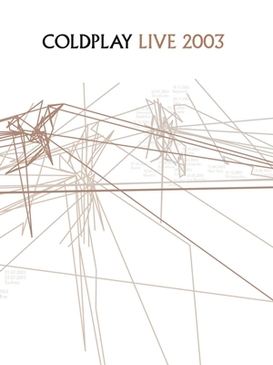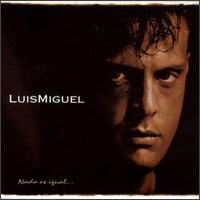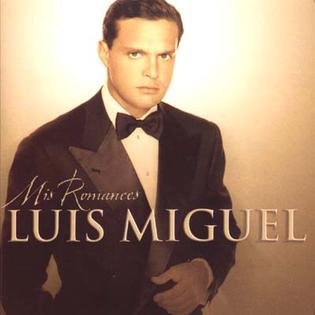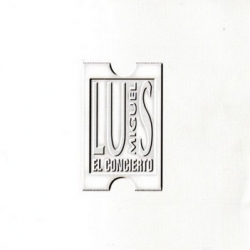
Luis Miguel Gallego Basteri is a Mexican singer and record producer. Born in Puerto Rico, to an Italian mother and a Spanish father, he is often referred to as El Sol de Mexico, derived from the nickname his mother gave him as a child: "Mi sol". Luis Miguel has sung in multiple genres and styles, including pop songs, ballads, boleros, tangos, jazz, big band, and mariachi. Luis Miguel is also recognized as the only Latin singer of his generation not to cross over to the Anglo market during the "Latin Explosion" in the 1990s.

Juana Rosario Molina Villafañe is an Argentine singer, songwriter and actress, based in Buenos Aires. She is known for her distinctive sound, considered an exponent of folktronica, although it has also been described as ambient, experimental, neofolk, chill-out, indietronica, psychedelic, indie pop, and progressive folk.

Buena Vista Social Club is a studio album by Buena Vista Social Club, an ensemble of Cuban musicians directed by Juan de Marcos González and American guitarist Ry Cooder. Produced by Cooder, it was recorded at Havana's EGREM studios in March 1996 and released on September 16, 1997, through World Circuit internationally and Nonesuch Records in the United States. It is the only standard studio album exclusively credited to the Buena Vista Social Club.

Live 2003 is the first live album by the British rock band Coldplay. It was released on 10 November 2003 by Parlophone in the United Kingdom. However, Capitol Records made it available on 4 November 2003 in the United States, with screenings at select theaters being held a day before as well. Featuring the shows filmed at Sydney's Hordern Pavilion on 21 and 22 July 2003, the album marks the group's second live project after Trouble – Norwegian Live EP (2001).

Mexican recording artist Luis Miguel has released 21 studio albums, 30 compilation albums, three extended plays (EP) two live albums, two soundtrack albums and five box set. Luis Miguel has sold over 60 million records, making him one of the best-selling Latin music artists of all time. Luis Miguel is also the artist with the second-most number ones on the Billboard Top Latin Albums chart with nine albums. At the age of 11, he released his debut studio album, Un Sol (1982), which was certified platinum and gold in Mexico. The artist would release four more studio albums under the record label EMI: Directo al Corazón (1982), Decídete (1983), También es Rock (1984), and Palabra de Honor (1984). A Portuguese-language version of Decídete and Palabra de Honor were released in Brazil as Decide Amor and Meu Sonho Perdido, respectively. Luis Miguel made his acting debut in the film as the lead role on Ya nunca más (1984) and recorded its soundtrack. In 1985, he participated in the Sanremo Music Festival 1985 with the song "Noi ragazzi di oggi"; it placed second in the Big Artist category and was later included on the Italian-language edition of Palabra de Honor. In the same year, Luis Miguel recorded the soundtrack for the film Fiebre de amor, which he co-starred with fellow Mexican singer Lucero.

Romances is the twelfth studio album by Mexican singer Luis Miguel, released on 12 August 1997, by WEA Latina. It is the third album of the Romance series, in which Miguel covers Latin songs from 1940 to 1978. Aside from Miguel, the production also involved arranger Bebu Silvetti, and Armando Manzanero, who directed all of Miguel's Romance albums. Romances consists of twelve cover versions and two new compositions by Manzanero and Silvetti. Recording took place in early 1997 at the Ocean Way recording studio in Los Angeles, California.

Romance is the eighth studio album by Mexican singer Luis Miguel. It was released by WEA Latina on 19 November 1991. Although the production was originally intended as another collaboration with Juan Carlos Calderón, that plan was scrapped when Calderón was unable to compose songs for the album. Facing a new-material deadline in his recording contract, at his manager's suggestion Miguel chose bolero music for his next project. Mexican singer-songwriter Armando Manzanero was hired by WEA Latina to co-produce the album with Miguel. Recording began in August 1991 at Ocean Way Recording in Hollywood, California, with Bebu Silvetti the arranger.

Segundo Romance is the tenth studio album by Mexican singer Luis Miguel, released on 30 August 1994 through WEA Latina. Like Miguel's 1991 album Romance, Segundo Romance comprises cover versions of boleros written between 1934 and 1993. It was produced by Miguel with Juan Carlos Calderón, Kiko Cibrian and Armando Manzanero and recorded in early 1994 at the Record Plant in Los Angeles.

Amor a la Mexicana is the sixth studio album by Mexican singer Thalía, released on 24 June 1997, by EMI Latin. Recorded in the Crescent Moon Studios, Miami, with producers Emilio Estefan, Kike Santander, Bernardo Ossa, Pablo Flores, Roberto Blades and Javier Garza, the album blends a variety of genres bits of cumbia, salsa, and balladry.

Son is the fourth studio album by Argentine singer-songwriter Juana Molina. It was released on 23 May 2006 by Domino Recording Company. It has received critical acclaim.

Abriendo Puertas is a 1995 album released by Gloria Estefan. It is her sixth studio album as a soloist and second Spanish language album released.

Nada Es Igual is the eleventh studio album by Mexican recording artist Luis Miguel. It was released by WEA Latina on 20 August 1996. The album has a musical style similar to his previous pop album Aries (1993) on which Miguel performs power ballads and R&B tunes. Recording took place at the Record Plant Studios in February 1996, with production handled by Miguel and his longtime associate Kiko Cibrian. Its songwriting was assisted by Cibrian, Rudy Pérez, and Alejandro Lerner. The album was promoted by three singles: "Dame", "Cómo Es Posible Que a Mi Lado", and "Que Tú Te Vas"; the former became the most successful single reaching number two and number one on the Billboard Hot Latin Songs and Latin Pop Songs charts, respectively. To further promote the recording, Miguel launched the Tour America 1996 where he performed in several South American countries.

Mis Romances is the fourteenth studio album of Mexican singer Luis Miguel, released on 20 November 2001 by Warner Music Latina. It is the fourth album in the Romance series wherein Luis Miguel covers bolero standards from Latin America and includes two original compositions. Produced by Luis Miguel, the album was recorded at the Record Plant in Los Angeles, California with the participation of the Royal Philharmonic Orchestra at the Abbey Road Studios in London, England. The recording was promoted by three singles: "Amor, Amor, Amor", "Cómo Duele", and "Al Que Me Siga". It was further promoted by a tour in 2002 that had Luis Miguel performing in the United States, Latin America, and Spain. It was the highest-grossing tour of the year by a Latin artist in the U.S.

El Concierto is the second live album by Mexican recording artist Luis Miguel, released on 17 October 1995 by WEA Latina. It was recorded from his performances at the National Auditorium in Mexico and at the José Amalfitani Stadium in 1994 during his Segundo Romance Tour. The album features live covers of José Alfredo Jiménez's songs, which were previously unreleased. The first two songs were released as singles, the former reaching number one on the Billboard Hot Latin Songs chart and the latter peaking at number three on the same chart.

Me Estoy Enamorando is the sixth studio album by Mexican singer Alejandro Fernández. It was released by Sony Music Mexico on 23 September 1997. It marks a musical style change where Fernández performs pop ballads and boleros as opposed to ranchera music. His decision to record a pop album transpired after having aspirations to expand his audience. Fernández asked Emilio Estefan to produce his next project after listening to Mi Tierra (1993) by his wife Gloria Estefan. Recording took place at Estefan's Crescent Moon Studios in Miami, Florida. Estefan's partner Kike Santander co-produced the recording along with Estefan and composed most of the album's tracks. The musical style consists of pop-boleros with ranchera influences while the lyrics reflect the theme of love. Four singles were released from the album: "Si Tú Supieras", "En El Jardín", "No Sé Olvidar", and "Yo Nací Para Amarte". Each of them reached number one on the Billboard Hot Latin Songs chart in the United States. A tour to promote the album was launched in the US and Latin America.

Mariana "Lali" Espósito is an Argentine singer, actress, dancer, and model. She began her career in 2003 in the children's telenovela Rincón de Luz. Espósito continued to build her acting and singing career with subsequent supporting roles in other telenovelas such as Floricienta and Chiquititas. However, it was her main role in the telenovela Casi Ángeles that really propelled her to fame, making her a household name in Latin America, the Middle East, and Europe. From 2007 to 2012, she was a part of the popular teen pop band Teen Angels, which originated from the television series Casi Ángeles. The group was commercially successful and toured throughout Argentina and countries such as Israel, Spain, Italy, and Latin America.

Wed 21 is the sixth studio album by Argentine singer and songwriter Juana Molina. It was released on 28 October 2013 by Crammed Discs. From 2009 to 2012, Molina worked on the album independently, recording at her house in Buenos Aires. Musically, Wed 21 is a folktronica album with a sound similar to her previous releases, but with innovations like the use of bass, drums, many electric guitars, noise, a horn and more detailed electronics, which led the Argentine edition of Rolling Stone to describe it as her most "rocker" album. The album received rave reviews from music critics, who noted it was not a departure from her distinctive sound but still a progression.

Tres cosas is the third studio album by Argentine musician Juana Molina. It was released in 2002.

Halo is the seventh studio album by Argentine singer-songwriter Juana Molina, released on May 5, 2017, by Crammed Discs.

"Tattoo" is a song recorded by Puerto Rican singer Rauw Alejandro. It was written by Elena Rose, Daniel Rondon, Eric Duars, Colla, Mr. NaisGai, Rafa Rodriguez, and Alejandro, while the production was handled by Mr. NaisGai, Rondon, and Rodriguez. The song was released for digital download and streaming as a single by Duars Entertainment on February 12, 2020. A Spanish language reggaeton and pop urban song with a danceable rhythm, it portrays the full happiness of falling in love with a person. The song experienced commercial success in Spanish-language markets, reaching number one in Colombia, and the top-five in Argentina and Spain. It has received several certifications, including Latin quadruple platinum in the United States. An accompanying music video, released simultaneously with the song, was directed by Marlon Peña.




















